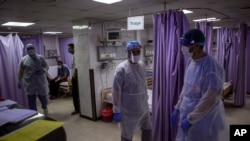The World Health Organization (WHO) Thursday called on governments worldwide to provide their health workers with the proper protection, as new data shows about one in seven – and in some cases, one in three – of all COVID-19 infections are among health care workers.
During a WHO briefing Thursday in Geneva, the director-general said health care workers do not just have to contend with the risk of infection.
“Every day, health workers are exposed to stress, burnout, stigma, discrimination and even violence," said Dr Tedros Adhanom Ghebreyesus.
WHO Emergency Programs Executive Director Mike Ryan said frontline health workers are under immense pressure every day.
“The least we can do is give them the tools, the training and the environments in which they can do that work at the safest possible level.” said Ryan, noting that when health workers feel safe, they do their jobs better.
Ryan was asked by a reporter about comments U.S. President Donald Trump made Wednesday, in which he contradicted the director of the U.S. Centers for Disease Control and Prevention, Robert Redfield.
Redfield, in testimony before a Congressional committee Wednesday, said a vaccine for COVID-19 could be broadly rolled out in mid-2021 and that using masks might be more effective than a vaccine to stem the spread of the virus. Trump later said Redfield was mistaken.
Ryan said Thursday consistent messaging from all levels of government is important.
“This is complicated stuff, data changes, information changes, evidence changes. So, it isn't easy, and it isn't easy for everyone to be on message all of the time,” said the WHO official.
Ryan noted that what is most important “is that governments, scientific institutions, step back, review the evidence, and give the most comprehensive, easy to understand and digest information so that people can take the appropriate action.”





